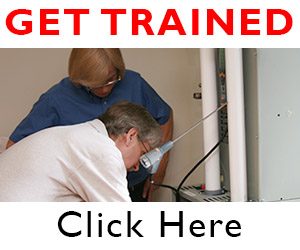As I write this column, the United States is sitting under what meteorologists call a heat dome – a weather system that traps hot air over certain geographical areas for extended time periods. This brings with it soaring high temperatures, pea-soup humidity, and the possibility of extreme weather.
During summer these can be the conditions in which your service and installation teams work, to the possible detriment of their health and safety. Here are some ideas that come from the U.S. Occupational Health and Safety Administration (OSHA) and other resources.
OSHA has safety training requirements that many HVAC contracting firms may or may not be aware of. You can learn more by visiting the OSHA website here: ncilink.com/OSHAsafety. As OSHA says, the best way to keep yourself and co-workers safe is to choose proactive safety, which means focusing on accident prevention.
Some Basics for Field Technician Safety
Here are some common sense things to think about as your teams head out into the field during the hot months. Techs should start off with self care, then equipment and environment care:
- Stay Hydrated — This is most important. Your techs must drink a minimum of 24 to 32 oz per hour, according to the CDC to stay hydrated.
- Keep Your Skin Covered — One of the most effective safety tips field technicians should practice is to keep their skin covered. Wearing a hat and gloves is a good start, but there are plenty of other best practices too like wearing a long-sleeved shirt tucked into pants. This keeps skin safe from sun exposure and subsequent burns.
- Inspect Protective Gear Every Time You Use It — Gear wears out, and can become defective over time. Always check gloves, fall protection equipment, eye protections, and so on. Report any faulty equipment to your manager and be sure NOT to use equipment involved in an incident.
- Focus on Health and Wellness — Stress, fatigue, and poor mental health can all contribute to injuries. Look for ways to improve total health outside of work, and talk about taking plenty of breaks, eating properly, and drinking fluids.
- Avoid Distracted Driving — Let’s face it, traffic accidents are among the most common ways to get seriously hurt when traveling to and from job sites. OSHA recommends to avoid distracted driving. This includes avoiding eating or talking on the phone when driving. Pull over if you feel tired or unwell.
- Don’t Take Shortcuts — While your end goal might be to move on to the next job, rushing can lead to a botched job and can put you at risk. Taking shortcuts can lead to accidents that can put you in a dangerous situation and get you hurt. Take a few extra minutes to be sure the job is done right and safely.
- Try to Work in Pairs — This is a Boy Scout rule that also applies to field techs. If you work alone and something happens, it can take longer to get help in an emergency. Working in pairs can reduce this time. By the way, ladder safety requires you to work in pairs.
- Report Near Misses — It is equally important to report near misses as well as actual incidents. Why? To find the root cause of that near miss and learn from it.
There are many other things you can do to keep your field workforce safe. Consult with your insurance company for more ideas. Many even provide safety training as part of their coverage. Be sure to take advantage of that.
And stay safe out there!













Recent Comments